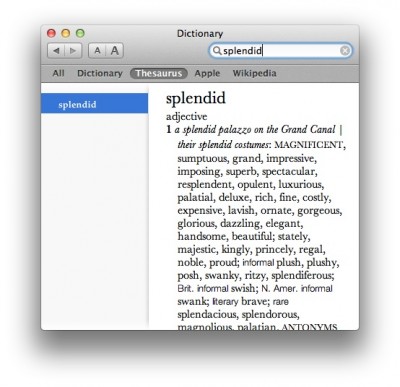Becoming smarter is always a smart idea. But after they boot you out of EMT class, not only do you still need to learn a few textbooks-worth of medicine before you’re a semi-competent provider, you also need to acquire a more mundane body of knowledge: how to sound like you’re competent.
You’ll be talking to other prehospital personnel, to nurses, to doctors, and to CNAs and LPNs; you’ll be writing out copious documentation; and of course you’ll be asking questions of patients themselves. And it’s one thing to know what you’re talking about, but it’s quite another to express it without sounding like a knob. Unfortunately, some things are just hard to say concisely and cleverly. More importantly, for some things there’s simply one right way to say it, and anything else isn’t really accurate. The world of medicine has come up with conventional phrases to describe most of these, but you need to learn them before you can use ’em. It’s one of those subtle skills you develop as your experience grows.
Of course, providing shortcuts to experience is why we’re here. So here are a few terms that will make you sound a little more intelligent the next time you’re giving a report or writing a narrative.
Don’t say…
Pooping
Say…
Moving his bowels, having a bowel movement
“Have you been moving your bowels lately, Mr. McGillicuddy?”
Don’t say…
Peeing
Say…
Urinating, making urine
“She just started dialysis recently, but she does still make a small amount of urine.”
Don’t say…
Normal
Say…
Unremarkable
“Her vitals and physical exam are unremarkable.”
Don’t say…
It’s totally there, dude
Say…
Present, apparent, visible, palpable, appreciable
“A Foley catheter is present, and a 2cm hematoma is visible on the dorsum of the left hand. No other trauma is apparent. Breath sounds are appreciable bilaterally.”
Don’t say…
… and there’s tons of it.
Say…
Profound
“She reports profound vertigo elicited by any movement of the head.”
Don’t say…
CSM is totally good bro
Say…
Peripheral circulation and neuro function intact
“Does he have any neuro deficits?”
Don’t say…
Basically he seems okay
Say…
Stable, intact, atraumatic, without abnormality
“He appears grossly atraumatic, with no apparent injury to the head, and the neck and back are stable and non-tender.”
Don’t say…
You can hear it from Cincinatti
Say…
Audible from the bedside
“Coarse, biphasic crackles are audible from the bedside, and present in all fields upon auscultation.”
Don’t say…
We didn’t look too hard
Say…
Readily, grossly, obviously, generally, frankly
“He appears generally well, without obvious injury or gross neuro deficit. Radial pulses are not readily obtainable. No frank bleeding from the site.”
Don’t say…
Chow situation
Say…
Oral intake
“He has had minimal oral intake over the past three days”
Don’t say…
Pushes his feet
Say…
Plantarflex
“Equal strength bilaterally in grip and plantarflexion.”
Don’t say…
Shows
Say…
Demonstrates
“He demonstrates no speech slurring or pronator drift, but there is a mild left-sided facial droop at rest.”
Don’t say…
Eventually opened his eyes after we beat the shit out of him
Say…
Difficult to rouse
“He is found in bed, eyes closed and semi-Fowler’s. He rouses with difficulty to verbal stimulus, but repeatedly lapses back to sleep without ongoing stimulation.”
Don’t say…
AOx4
Say…
Describe it!
“He presents as alert, in no apparent distress, generally oriented with some confusion; he is conversational and aware of his circumstances, but is unsure of the date and demonstrates poor short-term recall.”
Don’t say…
Walks like a drunk
Say…
Ataxic
“He demonstrates slurred speech, generalized ataxia, and a sweet odor is detectable in his breath.”
Don’t say…
Pissed himself and shit everywhere
Say…
Voided, incontinent of bowel or bladder
“He’s incontinent of both bowel and bladder, and he did void his bladder en route.”
Don’t say…
“ehn rowt”
Say…
“on root”
“En route is from the French, and it’s pronounced ‘on root.’ Saying ‘ehn rowt’ is some weird faux-accented hyper-compensation that the public safety world has all started doing, but that doesn’t make it right.”
Don’t say…
Agrees only after we asked about it
Say…
Endorses
“He denies pain of any kind, but does endorse mild tightness and discomfort in the left shoulder.”
Don’t say…
Sniffles and other cold-like symptoms
Say…
Coryzal symptoms
“He notes a headache and coryzal symptoms for the past two days, and nausea beginning today.”
Don’t say…
General systemic symptoms preceeding a seizure, syncope, etc
Say…
Prodrome
“He denies prodromal symptoms preceeding the fall, and bystanders observed no apparent loss of consciousness.”
Don’t say…
Without torture
Say…
Easily, freely
“He ambulates easily, and freely rotates his head past 45 degrees without pain.”
Well, that’s what I’ve got. Toss ’em into your toolbox and use whatever works for you. Anybody else have some useful words to share?
More things to say in part 2

Recent Comments